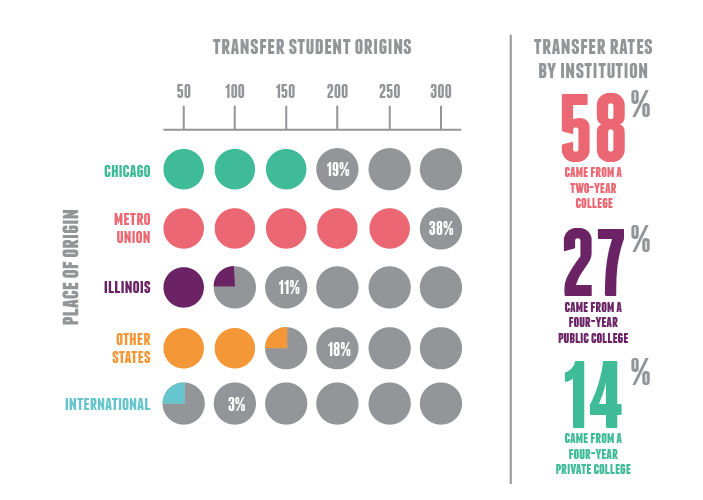Columbia eases transfer process
March 3, 2014

Information from Office of Institutional Effectiveness
To better accommodate incoming transfer students’ credits, Columbia sent a statement of intent to the Illinois Board of Higher Education Feb. 25 asking to participate in the Illinois Articulation Initiative, a statewide program meant to ease the transfer process between participating institutions. The program is expected to begin in fall 2014.
The IAI program, which launched in 1998, sets an agreed-upon core package of general education courses that are guaranteed to transfer between participating in-state colleges but does not guarantee course-to-course transfers. Columbia’s participation would save transfer students time and money, and make the overall process smoother, according to Patricia Mackenzie, assistant dean of the School of Media Arts and adjunct faculty in the Arts Entertainment & Media Management Department.
“The world is complicated enough,” Mackenzie said. “The easier we can make it for students, the better. It’s a really generous, open package and it gives students the opportunity to delve right into their majors.”
Mackenzie said it has been historically difficult for students to transfer previous college credits into Columbia’s curriculum, but the college has been making strides toward simpler credit transfers for the past year and a half by analyzing LAS courses and finding matches for other participating colleges, which she said will decrease the burden of transferring.
The college participated in this initiative once before, but the previous provost, Steven Kapelke, put a freeze on the IAI in 2006, according to Keri Walters, assistant dean of faculty advising in the School of Fine and Performing Arts. She said Louise Love, interim provost and vice president of Academic Affairs, recently lifted that freeze.
“Shortly after the [freeze was lifted], the whole transfer initiative project started,” Walters said. “I’m really excited that we will be retuning to IAI.”
Krista Jackson, IAI coordinator, said there are two levels of the IAI program and Columbia currently participates on the first level, which only allows students to transfer to Columbia using the credit package. She said the second level would allow students to easily transfer from Columbia to other participating colleges. Although Columbia is currently participating on the first level, they have the option to upgrade to the second level if they choose.
Jackson said the only participation requirement for colleges is that they are Illinois accredited. She said there are many advantages for colleges that participate in the initiative because they are offering their students more options throughout their college career, which helps students graduate faster.
“It’s good for students to know that if they’ve taken courses at one of the other institutions that participate in the program, the student will get credit for those courses,” Jackson said.
Mackenzie said there are some exceptions as to when Columbia would not accept specific transfer credits, like when a student has earned a C or below in a class or if the class is not offered at Columbia.
She said a committee decides which credits are transferable into Columbia’s curriculum. The committee is made up of the educators from the Office of Degree Evaluation, the assistant deans in each of the three schools and faculty members from the departments that pertain to those particular courses and credits in question.
Although many transfer students have historically been required to take the First Year Seminar course, Mackenzie said transfer students who have at least 24 transferable credits will now be exempt from taking the class.
Corbin Merriman, a sophomore theater major, said he transferred to Columbia in fall 2013 from the University of Mount Union in Alliance, Ohio, because he wanted to participate in the comedy writing and performance program in the Theatre Department, a program his previous college did not offer.
Merriman said only 25 of his 32 completed credits transferred because some classes he took at UMU did not correspond with Columbia’s curriculum. However, some of the credits that transferred are now useless to Merriman because they do not relate to his new major.
“I was thankful that a lot of the credits transferred over,” Merriman said. “But once I realized that some of them didn’t count for anything unless I changed [my major], I just kind of sucked it up and did it.”
Merriman said he supports the college’s decision to participate in IAI because it will make it more likely that students get credit for previous coursework.
“I think it will be a lot easier,” Merriman said. “If they take this initiative to make it easier on transfer students, the word will get out that it’s not a pain in the a– to transfer here.”
According to Institutional Effectiveness statistics, the number of transfer students has decreased. In fall 2011, Columbia had 1,167 transfer students and in fall 2013 had decreased to 682, 256 of them coming from the metro region. Despite the decrease, there is still a substantial amount of transfer students and according to Mackenzie, the new initiative will invite more transfer students to the college in the future.







